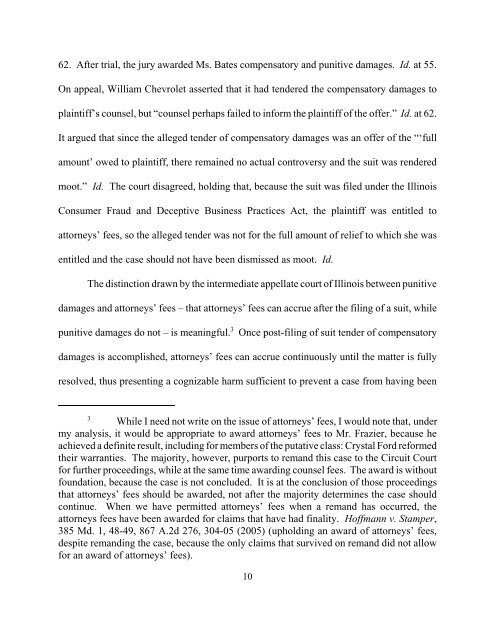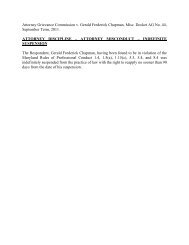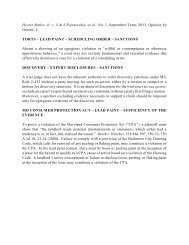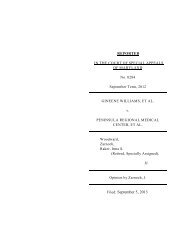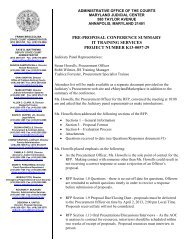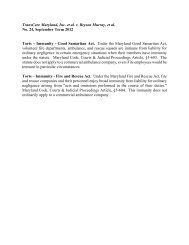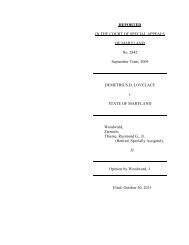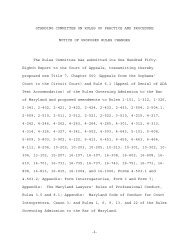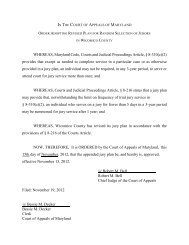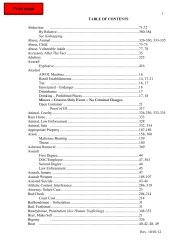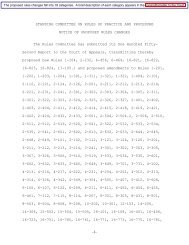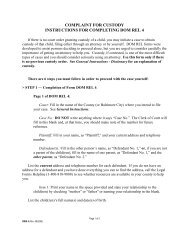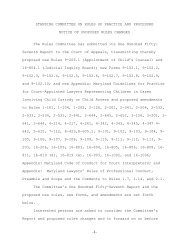Anthony M. Frazier v. Castle Ford, Ltd., f/k/a ... - Maryland Courts
Anthony M. Frazier v. Castle Ford, Ltd., f/k/a ... - Maryland Courts
Anthony M. Frazier v. Castle Ford, Ltd., f/k/a ... - Maryland Courts
You also want an ePaper? Increase the reach of your titles
YUMPU automatically turns print PDFs into web optimized ePapers that Google loves.
62. After trial, the jury awarded Ms. Bates compensatory and punitive damages. Id. at 55.<br />
On appeal, William Chevrolet asserted that it had tendered the compensatory damages to<br />
plaintiff’s counsel, but “counsel perhaps failed to inform the plaintiff of the offer.” Id. at 62.<br />
It argued that since the alleged tender of compensatory damages was an offer of the “‘full<br />
amount’ owed to plaintiff, there remained no actual controversy and the suit was rendered<br />
moot.” Id. The court disagreed, holding that, because the suit was filed under the Illinois<br />
Consumer Fraud and Deceptive Business Practices Act, the plaintiff was entitled to<br />
attorneys’ fees, so the alleged tender was not for the full amount of relief to which she was<br />
entitled and the case should not have been dismissed as moot. Id.<br />
The distinction drawn by the intermediate appellate court of Illinois between punitive<br />
damages and attorneys’ fees – that attorneys’ fees can accrue after the filing of a suit, while<br />
punitive damages do not – is meaningful. 3<br />
Once post-filing of suit tender of compensatory<br />
damages is accomplished, attorneys’ fees can accrue continuously until the matter is fully<br />
resolved, thus presenting a cognizable harm sufficient to prevent a case from having been<br />
3<br />
While I need not write on the issue of attorneys’ fees, I would note that, under<br />
my analysis, it would be appropriate to award attorneys’ fees to Mr. <strong>Frazier</strong>, because he<br />
achieved a definite result, including for members of the putative class: Crystal <strong>Ford</strong> reformed<br />
their warranties. The majority, however, purports to remand this case to the Circuit Court<br />
for further proceedings, while at the same time awarding counsel fees. The award is without<br />
foundation, because the case is not concluded. It is at the conclusion of those proceedings<br />
that attorneys’ fees should be awarded, not after the majority determines the case should<br />
continue. When we have permitted attorneys’ fees when a remand has occurred, the<br />
attorneys fees have been awarded for claims that have had finality. Hoffmann v. Stamper,<br />
385 Md. 1, 48-49, 867 A.2d 276, 304-05 (2005) (upholding an award of attorneys’ fees,<br />
despite remanding the case, because the only claims that survived on remand did not allow<br />
for an award of attorneys’ fees).<br />
10


